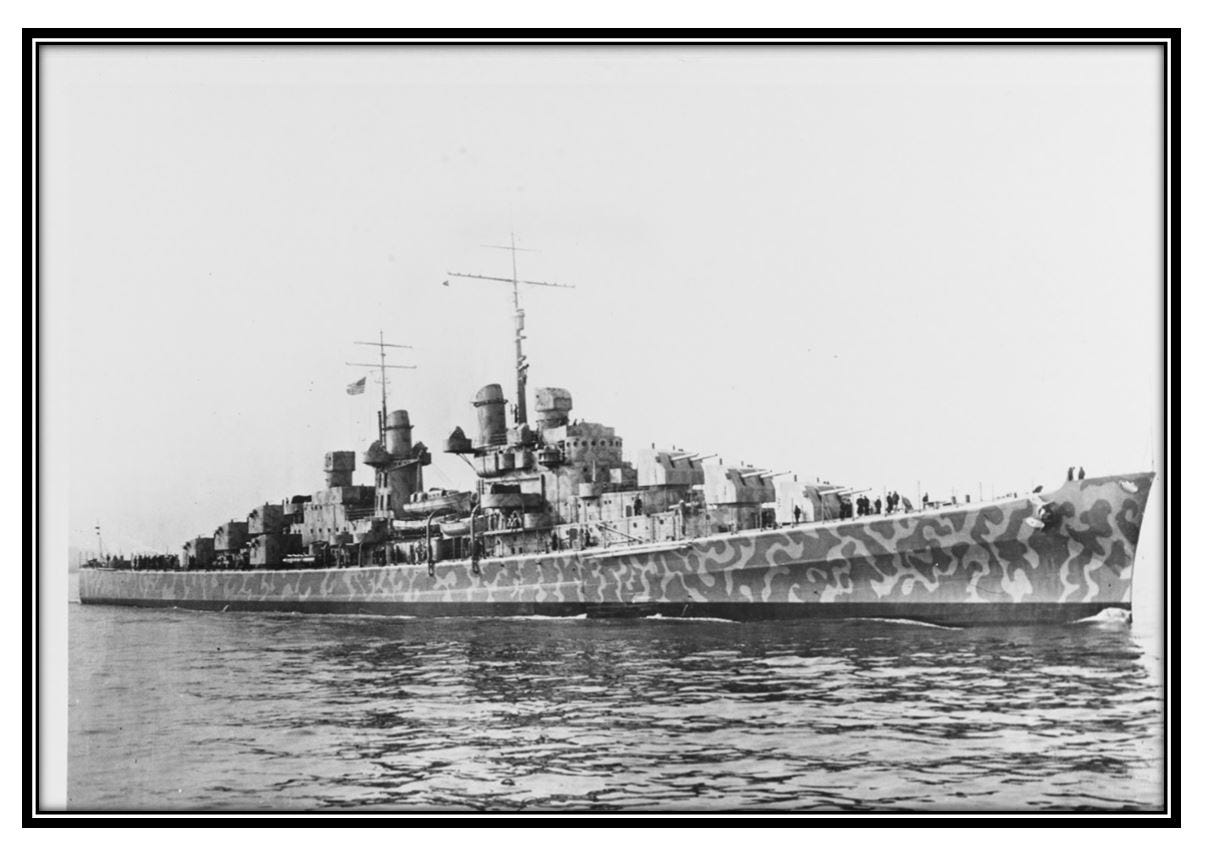TDIH: USS Juneau hit near Guadalcanal
The sea was peaceful. It seemed that the worst was behind everyone. Then, out of nowhere, two torpedoes broke the tranquil scene.
On this day in 1942, the destroyer USS Meade steams into an area near the Solomon Islands. Crew members expected to find survivors of USS Juneau floating nearby. Instead, they discovered an oil slick—and nothing else.
Where could Juneau’s survivors be? It had been four days since that vessel sank.
Juneau had been present at the first Naval Battle of Guadalcanal, on the night of November 12-13. (See November 15 post.) Communication problems plagued the American vessels throughout the conflict—and the moonless, dark night simply made matters worse.
In the midst of the chaos, Juneau was hit and momentarily spun out of control. It was being pushed towards a Japanese vessel that was already ablaze.
“We closed relentlessly on that island of fire,” signalman Joe Hartney later said, “swept forward by our momentum and powerless to stop. I could see Japs leaping over the side into the water, men struggling in the inferno, a weird unforgettable pageantry that Dante himself could not have dreamed up.’”
Hartney feared he wouldn’t survive: His thoughts turned toward his wife and new baby. What a relief when Juneau escaped the battle and began a long, limping journey back to base. Fortunately, USS Helena and other surviving ships joined Juneau just before dawn. USS San Francisco was in bad shape, so Juneau loaned several members of its medical staff to help.
The sea was peaceful. It seemed that the worst was behind everyone. Then, out of nowhere, two torpedoes broke the tranquil scene.
A Japanese submarine had found the small group of Americans.
San Francisco steered away from the torpedoes, as did Helena. Unfortunately, Juneau didn’t see what was coming, and its damaged communications system left little time to issue a warning. Instead, at 11:01 a.m. on Friday the 13th, a torpedo smashed into Juneau. The ship exploded on impact.
Juneau’s doctor was aboard San Francisco, preparing to operate on that ship’s wounded Captain. Suddenly, he heard “the most terrific explosion I shall ever hear.” Out the porthole, he saw “tremendous clouds of gray and black smoke.”
He’d just watched his own ship go up in smoke.
Aboard Juneau, Hartney was struggling to survive. He felt himself being pulled under. “The pressure from the depth began to close in upon me,” he later described, “to squeeze my brains like a giant vise, and to crush my lungs. . . . There was a great roaring in my brain and dots and streaks of fire seemed to sear my eyeballs. I knew that it was the end.”
Seaman Second Class Frank Holmgren wasn’t doing much better. He was blown into the air when the torpedo hit. He went overboard, clutching a life preserver that just happened to hit his hand. It was a blessing. He didn’t know how to swim.
The youngest crew member on the ship, Allen Heyn, thought he was a goner. His foot was trapped under a slab of steel as the ship went down. “And so I just gave up,” he later said. “I just thought there wasn’t a chance at all.”
Fortunately, a secondary explosion rocked the remnants of Juneau as it sank: Otherwise doomed men were blown clear. Of the 700 crew members aboard Juneau, nearly 180 are thought to have survived the initial blasts.
Famously, five Sullivan brothers were then serving aboard the ship, simultaneously. As many as three were among the survivors who found rafts, buoys, and nets in the water—and waited for help.
That help didn’t come for nearly a week.
What took so long? The story concludes tomorrow.
Sources can always be found on my website, here.





May we live to be worthy of their sacrifice.
Your article is riveting. It is difficult to imagine the horror, terror and suffering these men went through. Although I know the terrible outcome, I am looking forward to reading more.